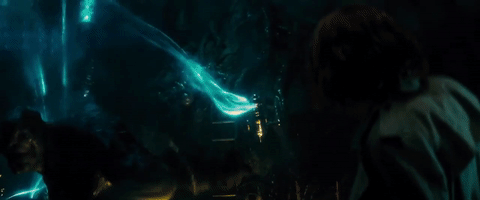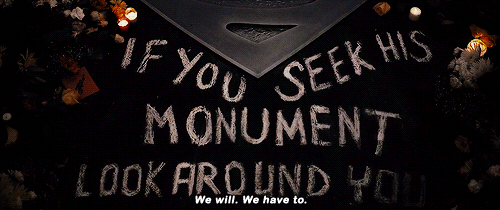Dispelling Myths: Public Perception of Superman in Batman v Superman
- RealDilios300

- Jan 22, 2019
- 6 min read
Due to the narrative focus of the movie, it is easy to walk away thinking that the majority of the world despised or distrusted Superman. Some have even used this misconception to suggest that the ending (which has Superman accepted and mourned in death) is not earned. However, several times in the film, characters state that the majority are pro-Superman. It is just that events in BvS (Batman v Superman) show a turn in public perception steered by Lex Luthor. Also, one of the main point-of-view characters (Bruce Wayne) has a negative outlook on Superman, further causing audiences to mistake the exact state of the world’s view on him.
Overall, there are three main perspectives: 1) most popularly, Superman is someone who has done and wants to do good; 2) there are those who wrongly want to worship him; and 3) the most vocal - but certainly a minority - group thinks he cannot be trusted and should not intervene. Since the narrative has the government formally question Superman’s actions; has the media publicly scrutinize those actions; has Lex manipulate events to demonize him; and has Batman on a crusade to kill him: the film tends to emphasize the third group (especially with Bruce, Lex, and Senator Finch representing aspects of it).
The Negative Minorities:
1. “Mankind is Introduced to the Superman” shows Bruce Wayne’s POV during the Black Zero Event (the World Engine attack, specifically the ground zero destruction in Metropolis) and the fight between Superman and Zod. This scene establish how Bruce turns to rage after facing loss (of personnel, property, and sense of power in the world). This scene also plants Wallace Keefe’s problem with the man in the sky. Later Alfred shows footage of Superman and Zod, and he implies that Batman’s “new rules” and massive changes is due to that very rage and powerlessness brought onto him by Superman’s existence; it is no mistake that the scene following those lines is our introduction to Lex Luthor. These three men are so existentially challenged by Superman that they plot against him (Lex and Bruce to kill him) in order to right their perceived notions of the world and regain their sense of power.
2. “Men with power obey neither policy nor principle, Miss Lane. No one is different. No one is neutral.” While this is not explicitly said about Superman, it does prelude the thematic questions and qualms (such as the harm unilateral action and by whose will he acts upon) Sen. Finch brings up about him. It also fits with Lex’ proposed “oldest lie in America: that power can be innocent.” These further dovetail into “power corrupts and absolute power corrupts absolutely.” All of this suggests that the basic nature of Superman means he is or will be bad.
3. Machinations and Manipulation: Lex has private security contractors working for a rebel general; additionally, Lois Lane just so happens to be awarded his first allowed interview. After her arrival, the contrators massacre the general’s men, pile the bodies together, and burn them ahead of Superman’s arrival. Lex knows he will intervene when Lois is in danger, and the state of the dead rebels brings question to whether Superman bears responsibility. Also, the power vaccuum caused by the incident creates chaos in the village. And it does not help that Superman takes out a U.S. military drone, good reason or not.
4. Manipulation: Lex further controls the narrative by having a paid actress appear before a Senate Committee and lie about (or embellish) the events following Superman’s arrival. This influences the committee to “[hold] Superman responsible.” In a later interview, she is scripted to question whose hero Superman is before asking: “How he decides which lives count and which ones do not?” Not only is this meant to stir the public with its conceit, but it is a targeted assault on Clark’s conscience.
5. Keefe’s “False God” graffiti introduces the concept that some people have started to deify Superman. This causes two bad ideologies: 1) people glorifying him above what he is and potentially worshipping him (like the Day of the Dead crowd), and 2) people like Lex who focus all their vitriol towards God onto him. Ideas like “devils don’t come from beneath us… they come from the sky”, “looking for a savior… believe in a higher power… [and] messianic figure,” “following people with great power down paths that [lead] to huge human atrocities,” “if God is all powerful [slash ‘all good’ patadox]… then neither can you be,” and protest signs that say: “God hates aliens” and “Superman Saves” fit right into this, as well as the Superman zealots in the Knightmare (future glimpse Bruce gets from Flash).
6. Bruce rationalizes his hatred of Superman by assuming his immense power coupled with his history in Gotham (which meshes with the philosophy of number 2 above) will eventually lead to him “burning the whole [world] down” and there not being a way to stop him. His 1% dogma built out of this rationalization only gets strengthened by the Knightmare.
7. The “Must There be a Superman” montage has the media pick apart what Superman means to the world. It highlights how certain people have imposed things onto him that necessarily are not there. Machinations and Manipulation: Lex gets Keefe into the hearing along with a lead-lined wheelchair full of explosives. Not only does the bombing keep Superman from giving his side and possibly winning over members of these minority groups but it also gets these people and the media to question if he had an involvement - in any degree - to it: “initually Superman was helping… but he seems to have disappeared, raising questions,” “was [Superman] complicit in the Capitol tragedy,” “was Superman involved?,” “here’s a man with almost unlimited power and yet he did nothing to stop the bomber,” “idea that Superman was a co-conspirator… all roads… leading to the Kryptonian visitor,” “if Superman‘s not involved - if he has nothing to hide - then why hasn’t he been seen since… the tragedy?”
The Positive Majority:
1. When Lex tries to get support for a kryptonite import license, he claims it can be a silver bullet against the Kryptonians. To which he gets the reply: “Last I looked, the only of those flying around was Superman.” While the guy who says it does turn around and help Lex, it shows that he publicly conforms to the accepted view on Superman.
2. In Keefe’s apartment, there are clippings of Superman’s heroics. One claims he’s “the most famous man.” Others mention a rescues/saving of a bus of kids in rapids, a girl from a burning building, people from a building explosion, and a starving homeless man. He also prevented a missile strike, an earthquake, a volcano, and a supervirus. Clearly he has goodwill with the masses.
3. The Superman memorial at Heroes Park (later called “beloved” during the Doomsday event) commemorates all the people who died during the BZE as well as Superman’s efforts to save the world.
4. When Perry sees the Wallace Keefe news, he proposes the headline: “End of Love Affair with Man in the Sky?” This further suggests a general love or fondness for Superman. This is further hammered down when Bruce mentions that The Daily Planet writes a “puff piece editorial” every time Superman “saves a cat from a tree.”
5. In response to Bruce’s snide remarks, Clark gives the audience the first generalization to contextualize the global perception of Superman: “Most of the world doesn’t share your opinion, Mr. Wayne.” Since Clark is someone of high moral standing and a reporter (and also the person in question) who would be in the know of public opinion, we can take the statement at face value. Lois adds that people get hope from him [but I would argue that the people of whom “it‘s all that gives them hope” are part of what causes controversy and are not healthy individuals, just in the opposite vein as Bruce and Lex].
6. “The fact is, maybe he’s not some sort of devil or Jesus character. Maybe he’s just a guy trying to do the right thing.” This is the statement that removes all the politics and religious beliefs imposed onto the Superman and just looks at the man. I would argue that this is how normal, every day citizens look at him. Martha Kent later tells Clark that “… they see what you do, and they know who you are. You’re not a killer, a threat.” Both the family and workers who see the burning of a Superman effigy appear appalled.
The Ending:
Superman’s selflessness in the face of death and sacrifice for humanity alongside Lois’ takedown of Lex helps absolve him of numbers 2, 3, 4, 6, and 7. This allows the majority group to now have a larger focus. The streets and businesses of Metropolis are shown vacant because they are all out for Superman’s funeral (some along with much of Smallville at Clark’s). Furthermore, the people made him a new monument. But not one made in his image; one that calls attention exactly what he has done.
Although Bruce no longer holds to 1, both it and 5 will never fully go away unfortunately. They will always be the source of Superman’s real conflict: they define who his enemies are but also place the societal world onto his shoulders (which I consider his greatest challenge and why I love Zack Snyder’s Man of Steel and Batman v Superman).
If there is anything I missed or got wrong, please let me know in the comments below.







Comments